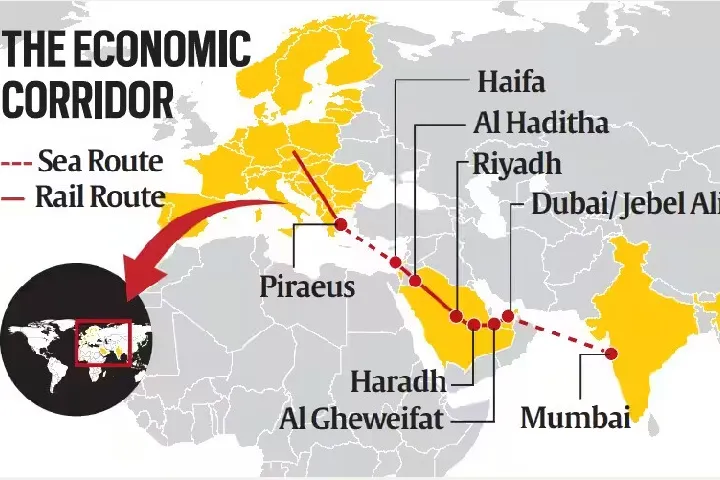

India-Middle East-Europe corridor is expected to open supply chains for energy and food transportation
Arab News, considered the most prominent voice of the Arabs, went ga ga over the G20 summit being held in New Delhi. All its leading reports on the gala gathering, with Prince Mohammed Bin Salman sharing stage with Prime Minister Narendra Modi and US President Joe Biden announcing the signing of MoUs on ambitious projects between India, the Middle East, and Europe for the construction of a new economic corridor.
The corridor will include pipelines for electricity and hydrogen. It will contribute to developing and rehabilitating the infrastructure that includes railways, and ports and will help increase the exchange of goods and services. It aims to link Middle East countries by railway and connect them to India by port, helping the flow of energy and trade from the Gulf to Europe, by cutting shipping times, costs and fuel use.
Arab News quoted the crown prince saying at the G20 that the project seeks to achieve the common interests of “our countries by strengthening economic interdependence.”
The newspaper, unlike commentaries in most of the world media, avoided the comparison of the deal with China’s ambitious Belt and Road Initiative (BRI).
Gulf News and Khaleej Times, another two major voices of the Arab world, too were jubilant over the corridor deal and expressed that soon Emiratis will be linked to Europe and Europeans directly. Unlike Arab News, Khaleej Times was explicit in commenting over the corridor’s clash with China’s BRI. “The pact comes at a critical time as US President Joe Biden seeks to counter China’s Belt and Road push on global infrastructure by pitching Washington as an alternative partner and investor for developing countries at the G20 grouping,” it said.
Qatar-based Al Jazeera’s correspondent Katrina Yu is in New Delhi covering the G20 summit. She was there at the moment when the MoUs were signed between India, Saudi Arabia, the United Arab Emirates, Jordan, Israel and the European Union to help boost trade, deliver energy resources and improve digital connectivity.
“Details are pretty scant at the moment. But US and European officials who were present during that announcement hailed it as a game-changer, as historic. They said it will cut trade time between India and Europe by 40 percent,” she said while reporting for her global channel.
She spoke to a lot of representatives at the summit after signing of the deal and her perception was that there was a feeling that it was counterweight to China’s BRI project. “China’s powers are increasing so rapidly that many countries feel the need to have alternatives. India was not part of the Belt and Road Initiative, so this initiative gives connectivity to India,” she said.
Egypt which will be a key component of the corridor as it sits on the cusp of the Middle East and Africa. The Egyptian press was upbeat that Cairo will now have upgraded relations with the EU and as the new corridor will be actualised, it will help make Egypt independent of foreign assistance to run its own affairs. This was the gist of a report on the corridor and President Fatah al-Sisi’s participation in G20 in Arabic newspaper Al-Masry Al-Youm.
Israel’s leading newspaper The Jerusalem Post also hailed the deal as a landmark decision at G20. “This project turns a dream into a reality,” the Post quoted Prime Minister Benjamin Netanyahu as saying, “It will change the face of the Middle East, the face of Israel, and will affect the entire world.”
“Israel will be a central junction in this economic corridor,” Netanyahu said. “Our railways and ports will open a new gateway from India, through the Middle East to Europe, and also back.”
The Post also mentioned China’s BRI but in a lighter vein. It moreover hoped that the project comes amid US efforts for a broader diplomatic deal in the Middle East that would have Saudi Arabia recognise Israel.
Observers of the Middle East also said that the corridor project will have far-reaching and multidimensional implications for all those countries that are part of it. “In a post-Covid and post-Ukraine War world, this connectivity and economic project will open supply routes to benefit countries in South Asia, West Asia, Africa and Europe. The focus is on to fulfill deficiencies of energy and food. Its geo-strategic significance is boundless. Yet, its objective is not to counter China’s BRI as is being seen in certain quarters. That may appear later as a consequence though,” said Professor Manjari Singh of Amity University while talking to India Narrative.
Sub Lieutenant Astha Poonia officially became the first woman to be streamed into the fighter…
As Israel awaits Hamas's response on Friday to the latest proposal for a hostage release…
Deputy Chief of Army Staff (Capability Development and Sustenance), Lieutenant General Rahul R Singh, on…
A report on Bangladesh's media landscape has revealed that the restrictive laws and political press…
Prime Minister Narendra Modi has said that India is actively working on creating a comprehensive…
The Indian Chamber of Commerce (ICC) on Thursday hosted the 14th India Minerals and Metals…